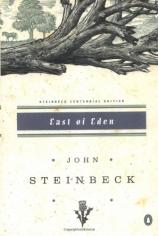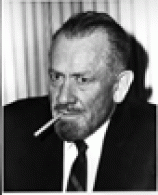East of Eden
Review
East of Eden
When he began EAST OF EDEN, John Steinbeck intended to write about his family, and how they settled in California. Along the way, the story grew and changed, until it became an allegory about good and evil and a symbolic re-creation of the biblical story of Cain and Abel.
Spanning the years between the Civil War and the end of World War I, the novel traces the story of two generations of brothers: Adam and Charles Trask, and Adam's sons, Aron and Caleb.
When Adam marries Cathy Ames, a manipulative, but beautiful prostitute, she betrays him on their wedding night and joins Charles. Shortly after the wedding, she gives birth to twin boys, after which she leaves her husband to return to her former profession.
Adam raises his sons the best way he can, never telling the boys about their mother. However, the twins are in constant competition for their father's approval. When it seems that Adam is paying more attention to Aron, Caleb reveals the truth about their mother to him in a moment of anger. Disillusioned and angry, Aron runs away and joins the army, and is later killed in France.
Commenting on EAST OF EDEN, Steinbeck wrote, "nearly everything I have is in it, and it is not full. Pain and excitement are in it, and feeling good or bad and evil thoughts and good thoughts." It is one of his greatest novels, a saga about the meaning of life that encompasses the best and worst of what it means to be human.
Reviewed by Judith Handschuh on February 4, 2002
East of Eden
- Publication Date: February 5, 2002
- Genres: Fiction, Literary Fiction
- Paperback: 601 pages
- Publisher: Penguin (Non-Classics)
- ISBN-10: 0142000655
- ISBN-13: 9780142000656





